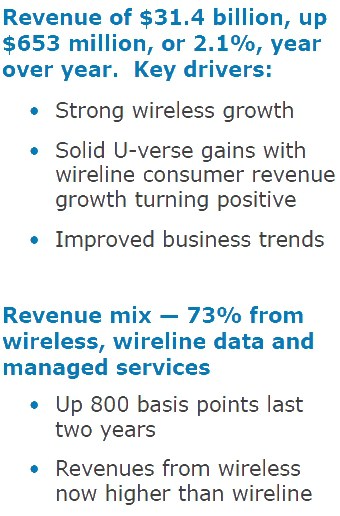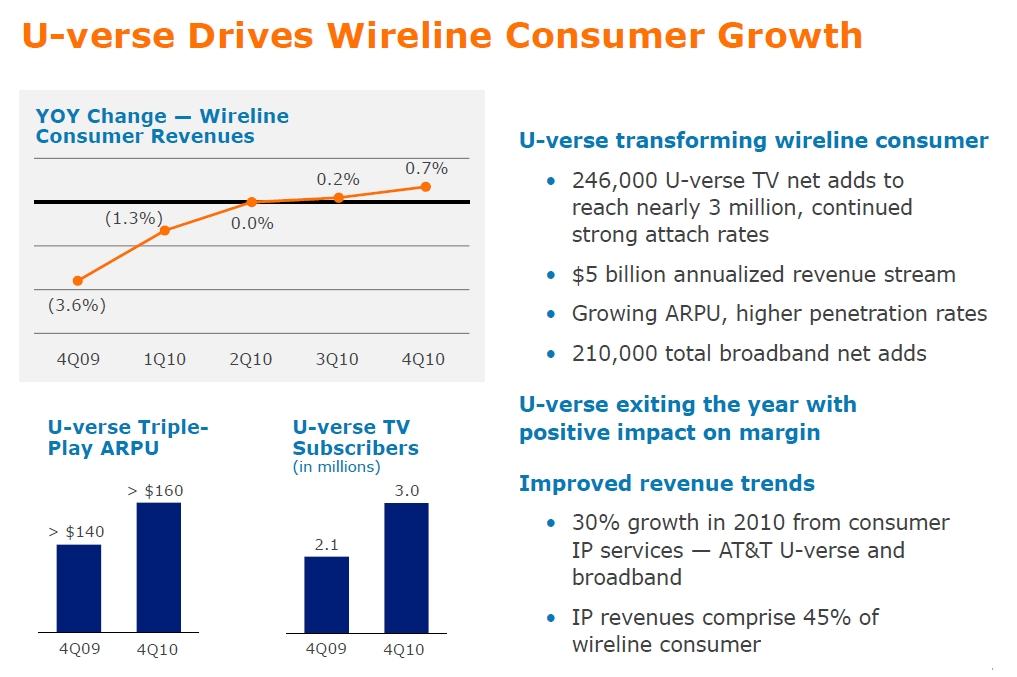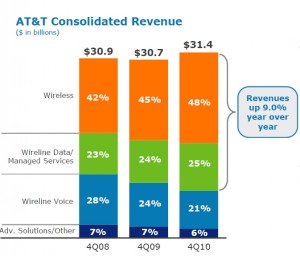AT&T’s announcement that it is will impose usage limits on its DSL and U-verse (wireline) customers this May is just another case of overcharging consumers for Internet access.
Stop the Cap! has been reviewing AT&T’s financial reports looking for justification for imposing usage controls on the company’s customers. Most providers who enact these kinds of pricing schemes claim they are about controlling heavy users, reducing congestion, and covering the costs to provide the service.
But after reviewing some of AT&T’s financial reports, the only explanation apparent for these limits is a quest for additional revenue and profits from subscribers.
AT&T continues to earn billions every quarter — $7 billion in the last three months alone — from its data products division, the vast majority of which comes from selling IP — Internet access — services to customers. At the same time, the company continues to cut operations and support expenses, reducing its operating costs, and increasingly relies on its wireless and wireline divisions for the majority of the company’s revenue.
There is no evidence AT&T broadband usage costs are significantly impacting the company’s revenue in any way. In fact, its U-verse platform, which can deliver higher speed, premium broadband service (at a correspondingly higher price) is actually delivering higher revenue from the “heavy users” the company is now complaining about.
In short, AT&T wants to reap the financial rewards of selling more costly, higher speed broadband service, but wants to limit customers’ use of those services.
We reviewed both the quarterly and annual results for AT&T’s wireline division and discovered what we routinely find true among every provider that wants to implement an Internet Overcharging scheme: the company wants to raise prices on broadband customers even as it enjoys ongoing cost reductions to manage broadband traffic and reduces the amount of investment made to manage it.

AT&T's own facts and figures tell the story of a company that has no need to slap usage limits on its broadband customers.
Some interesting facts from AT&T:
- AT&T earns $5 billion (annualized revenue stream) from its U-verse platform;
- AT&T saw 30 percent revenue growth from residential broadband alone;
- 45 percent of AT&T’s revenue in wireline services comes from broadband/IP services;
- In 2011, AT&T says it has a “focus on growth” — of revenue and profit, that is. The company seeks increases in its “operating margins,” plans capital expenditures that will be focused on a “slight increase in wireless spending,” and ongoing cost-cutting where possible.
AT&T plans to continue to invest in U-verse expansion, critical for a company that is rapidly losing revenue from departing landline customers. In the 2010 Annual Report, AT&T noted the vast majority of cash used in investing activities went towards construction costs related to improved wireless network capacity, which is dramatically different than wired broadband service, and U-verse. This does not cover ongoing expenses from providing the service.
It’s an important strategy for AT&T, which needs to replace revenue from lost landline customers:
We continue to lose access lines due to competitors (e.g., wireless, cable and VoIP providers) who can provide comparable services at lower prices because they are not subject to traditional telephone industry regulation (or the extent of regulation is in dispute), utilize different technologies, or promote a different business model (such as advertising based) and consequently have lower cost structures.
In response to these competitive pressures, for several years we have utilized a bundling strategy that rewards customers who consolidate their services (e.g., local and long-distance telephone, high-speed Internet, wireless and video) with us. We continue to focus on bundling wireline and wireless services, including combined packages of minutes and video service through our U-verse service and our relationships with satellite television providers. We will continue to develop innovative products that capitalize on our expanding fiber network.
Unfortunately, the benefits U-verse provides broadband users will be tempered by usage limits on it.
Considering AT&T’s U-verse pipeline is one giant broadband connection, the disturbing fact the company will not implement these overcharging schemes on its voice or video services cannot be ignored. Only the broadband service, on which customers could entirely bypass AT&T’s TV and phone products for a competitor, is impacted. The risk of that happening with the company’s usage cap is now diminished.
As Stop the Cap! has warned for nearly three years — this is the ultimate end run around Net Neutrality. Instead of actively blocking or throttling competing services, AT&T simply uses a usage limit to discourage customers from using the competitor, relying on unlimited AT&T TV and phone services instead.

AT&T's annual report illustrates the ongoing wireline losses attributable to departing landline customers.

U-verse represents a successful example of benefits earned when companies invest in their networks to provide improved service to customers.

But what happens when companies gradually reduce their expenses and investments in those networks? They try and make up the difference with an Internet Overcharging scheme that places limits on service to keep costs down and profits up.


 Subscribe
Subscribe


CEO salaries are never a “free ride” to Randians
Just switched from Charter to ATT UVerse because of usage caps. Sales rep at ATT said we have no plans to implement usage caps. So essentially, ATT delays their announcement a few months to soak up disgruntled (and I am disgruntled) cable Internet users before springing the trap.
I don’t believe their reasoning for the caps. I do believe in a corrupt political system and corrupt politicians. Net neutrality – DOA.